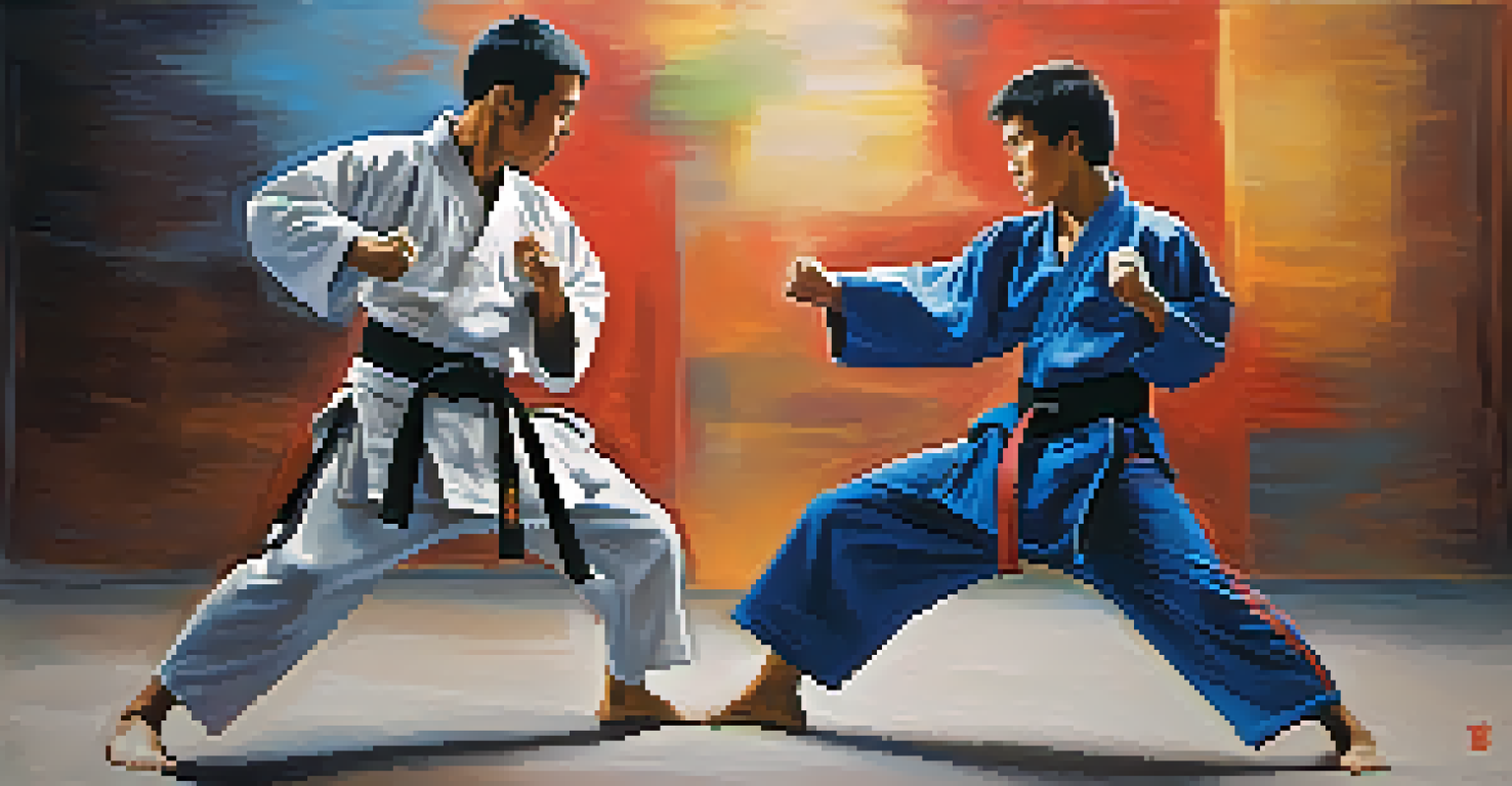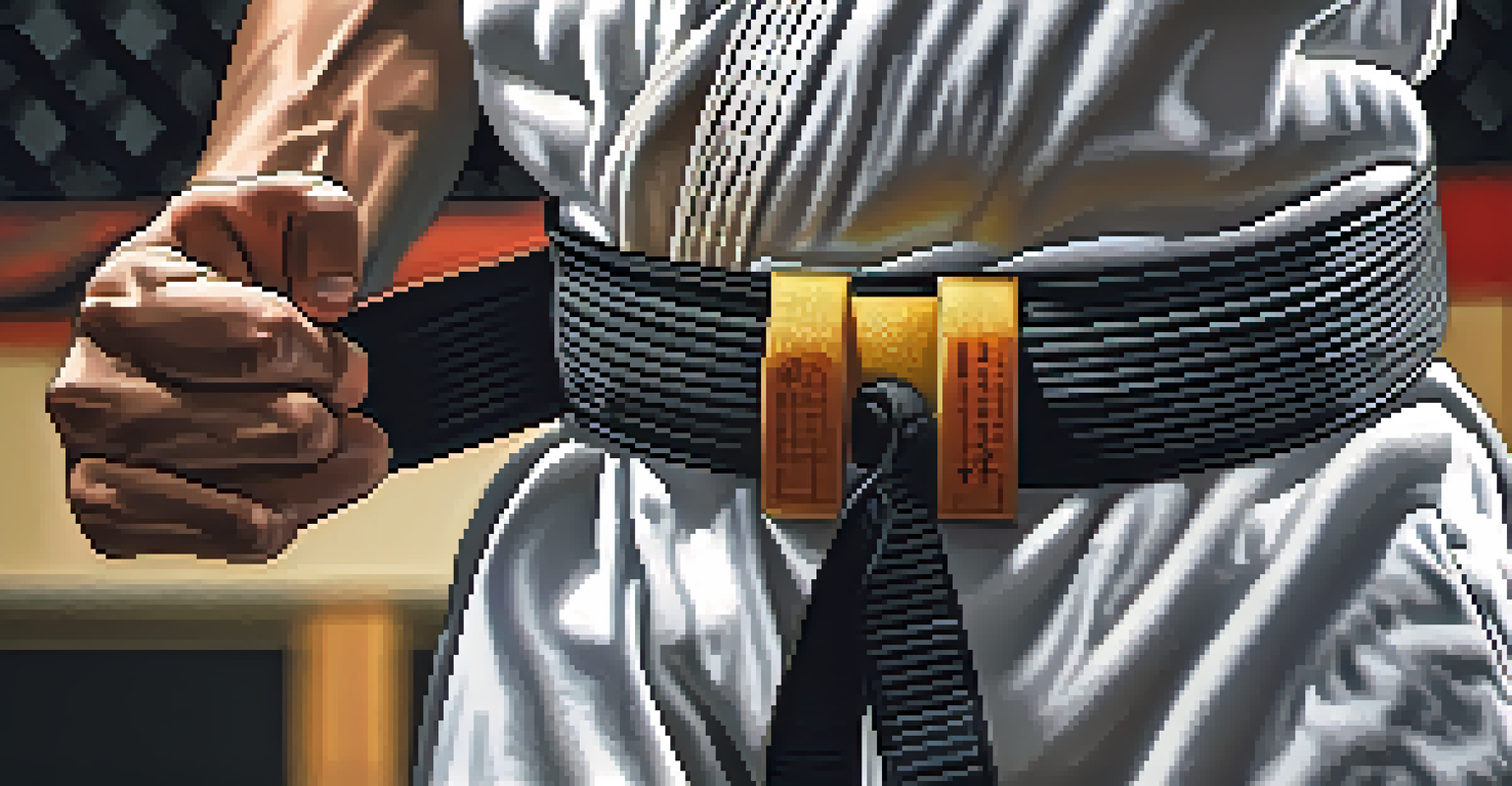Martial Arts: A Pathway to Developing Emotional Intelligence

Understanding Emotional Intelligence and Its Importance
Emotional intelligence, often referred to as EQ, is the ability to recognize, understand, and manage our emotions and the emotions of others. It plays a crucial role in our relationships, decision-making, and overall mental health. In a world that constantly demands interpersonal interactions, having a high EQ can set you apart in both personal and professional settings.
Emotional intelligence is the key to both personal and professional success.
Being emotionally intelligent means you can navigate social complexities with ease, showing empathy and understanding. This skill is not just innate; it can be developed through practice. Perhaps surprisingly, martial arts can offer a unique and effective pathway to enhancing these vital skills.
Martial arts training involves not only physical prowess but also mental discipline, making it an excellent medium for building emotional intelligence. By engaging in martial arts, practitioners learn to manage their emotions effectively, respond to challenges with composure, and understand the emotional cues of their peers.
The Role of Discipline in Martial Arts Training
Discipline is a cornerstone of martial arts practice, teaching students to commit to their training with consistency and focus. This kind of discipline fosters self-regulation, a key component of emotional intelligence. When practitioners learn to control their impulses and stay committed to their goals, they also develop a greater understanding of their emotional triggers.

As students progress through the ranks, they face various challenges that require resilience and perseverance. Overcoming these obstacles builds confidence and helps individuals learn how to handle stress and frustration. Each time a student masters a technique or achieves a new belt, they reinforce their ability to manage their emotions in the face of adversity.
Emotional Intelligence Enhances Skills
Martial arts training develops emotional intelligence by fostering self-awareness, empathy, and effective stress management.
Moreover, discipline in martial arts extends beyond the dojo. It influences daily life, encouraging practitioners to approach their personal and professional challenges with a balanced mindset. This newfound discipline can significantly improve their emotional interactions with others.
Developing Self-Awareness Through Practice
Self-awareness is a critical aspect of emotional intelligence, and martial arts training provides ample opportunities for its development. During practice, students must constantly evaluate their movements, reactions, and emotional states. This ongoing self-assessment helps them become more attuned to their feelings and those of others around them.
The greatest weapon against stress is our ability to choose one thought over another.
For instance, when a student learns a new technique, they may initially struggle and feel frustration or embarrassment. Acknowledging these emotions instead of suppressing them fosters a deeper understanding of personal emotional responses. As they continue to practice and refine their skills, they also learn to embrace vulnerability, which is essential for authentic connections.
Additionally, the practice of mindfulness, often integrated into martial arts, enhances self-awareness. By focusing on breathing and presence, practitioners can observe their thoughts and emotions without judgment, leading to a more profound understanding of themselves.
Building Empathy Through Partner Training
Empathy, the ability to understand and share the feelings of others, is another vital element of emotional intelligence that martial arts nurtures. Many martial arts involve partner work, where practitioners must communicate effectively and read their partner's cues. This interaction fosters a sense of connection and understanding.
During sparring or paired drills, students learn to anticipate their partner's movements and emotions. By tuning into their partner's reactions, they develop a greater appreciation for the feelings and perspectives of others. This exchange not only enhances their martial skills but also deepens their emotional connections.
Discipline Builds Emotional Resilience
The discipline learned in martial arts helps practitioners manage their emotions and handle challenges with confidence.
Moreover, experiencing both the role of the striker and the defender helps students cultivate a balanced perspective. They learn to recognize that every action has a reaction, and understanding this dynamic is crucial in various social situations outside the dojo.
Managing Stress and Emotions on the Mat
Martial arts training provides an excellent outlet for managing stress and emotions. Physical activity releases endorphins, which can improve mood and reduce anxiety. As practitioners engage in rigorous training, they learn to channel their emotions productively rather than letting them overwhelm them.
For example, when faced with a challenging sparring session, students often experience a mix of emotions, from adrenaline to fear. Learning to regulate these feelings during combat situations translates to improved emotional management in everyday life. They discover that they can face challenges head-on without succumbing to panic or frustration.
Additionally, the discipline of martial arts encourages a mindset of resilience. Practitioners learn that setbacks are part of the journey, and this perspective helps them cultivate emotional fortitude, allowing them to handle stress with grace and confidence.
Enhancing Communication Skills Through Martial Arts
Effective communication is at the heart of emotional intelligence, and martial arts training can significantly enhance this skill. Whether through verbal instructions from instructors or non-verbal cues during partner drills, students learn to express themselves clearly and understand others better. This practice is invaluable in both personal and professional contexts.
In martial arts, clarity in communication is essential for safety and progress. Students must articulate their needs and boundaries while also listening to their partners. This dynamic fosters active listening and thoughtful responses, leading to more meaningful interactions.
Communication Skills Are Key
Martial arts enhances communication skills through partner interactions, promoting active listening and clear expression.
Furthermore, as practitioners grow in their skills, they often take on leadership roles within their training community. Teaching and mentoring others require strong communication abilities, encouraging them to refine their emotional intelligence further.
The Journey of Personal Growth Through Martial Arts
Martial arts is more than just a physical discipline; it’s a journey of personal growth. The challenges encountered on this path teach valuable life lessons about perseverance, humility, and respect. As students progress, they gain insights into their emotional landscapes, enabling them to grow as individuals.
This journey often leads to profound transformations. Practitioners learn to set and achieve personal goals, whether mastering a difficult technique or earning a new belt. Each achievement reinforces their belief in their abilities and enhances their emotional resilience.

Moreover, the supportive community found in martial arts schools nurtures emotional growth. Practitioners share their experiences, challenges, and victories, creating an environment where they can learn from one another and build lasting friendships based on mutual respect and understanding.